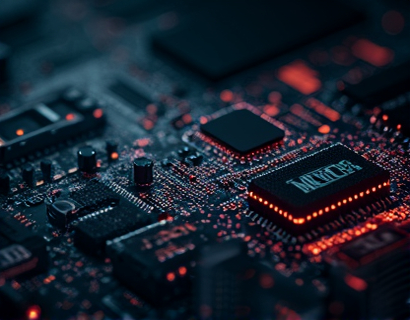Smart Contract Automation for Seamless Dividend and Earnings Distribution
In the rapidly evolving landscape of FinTech, the integration of smart contract technology has emerged as a transformative force in business financial management. This innovative approach offers a robust solution for automating dividend and earnings distribution, ensuring secure, transparent, and efficient payouts. By leveraging the immutable and decentralized nature of blockchain, businesses can significantly enhance their operational efficiency and reliability.
The traditional methods of dividend and earnings distribution are often plagued by delays, manual errors, and a lack of transparency. These issues not only strain the financial resources of companies but also erode trust among stakeholders. Smart contract automation addresses these challenges head-on, providing a systematic and automated process that minimizes human intervention and maximizes accuracy.
Understanding Smart Contracts
Smart contracts are self-executing contracts with the terms of the agreement directly written into code. They run on a blockchain network, which ensures that all transactions are recorded transparently and immutably. This technology eliminates the need for intermediaries, reducing costs and increasing the speed of transactions.
In the context of dividend and earnings distribution, smart contracts can be programmed to automatically release funds to shareholders or stakeholders once predefined conditions are met. For instance, when a company declares a dividend, the smart contract can be set to transfer the specified amount to each shareholder's digital wallet as soon as the dividend is approved by the board.
Benefits of Smart Contract Automation
The adoption of smart contract automation for financial management brings a multitude of benefits to businesses. Firstly, it significantly reduces the risk of human error, ensuring that payouts are made accurately and on time. This reliability is crucial for maintaining the trust of investors and stakeholders.
Secondly, the transparency provided by blockchain technology allows all parties to verify the distribution process in real-time. This level of transparency not only enhances trust but also simplifies auditing and compliance processes. Companies can easily demonstrate adherence to regulatory requirements, reducing the risk of legal issues.
Moreover, smart contract automation streamlines operations by eliminating the need for manual interventions and intermediaries. This not only cuts down on operational costs but also accelerates the distribution process. Businesses can allocate their resources more efficiently, focusing on core activities rather than administrative tasks.
Enhancing Operational Efficiency
The automation of dividend and earnings distribution through smart contracts leads to a more streamlined and efficient financial management process. By automating routine tasks, companies can reduce the workload on their finance teams, allowing them to focus on strategic initiatives.
For example, a company can set up a smart contract to automatically calculate and distribute dividends based on the number of shares held by each shareholder. The contract can be programmed to fetch the latest share data from a decentralized ledger, ensuring that the distribution is based on the most current information. This level of automation ensures that dividends are paid out promptly and accurately, without the need for manual calculations or approvals.
Case Study: Implementing Smart Contract Automation
To illustrate the practical benefits of smart contract automation, consider a hypothetical scenario involving a mid-sized tech company, TechCorp. Prior to implementing smart contract automation, TechCorp faced challenges in distributing quarterly dividends. The process involved multiple steps, including board approval, calculation of dividends, and manual transfer of funds to shareholders. This manual process was time-consuming and prone to errors.
By adopting smart contract automation, TechCorp simplified its dividend distribution process. The company created a smart contract that automatically triggers the dividend payout once the board approves the dividend amount. The smart contract fetches the latest share data from a blockchain-based ledger to ensure accurate calculations. As soon as the conditions are met, the funds are transferred directly to the shareholders' digital wallets.
This transition not only reduced the time taken for dividend distribution from several weeks to mere minutes but also eliminated the risk of human error. Shareholders could track the distribution process in real-time, enhancing transparency and trust. Additionally, TechCorp saved significant costs associated with manual processes, allowing the company to reinvest in growth initiatives.
Ensuring Security and Compliance
Security is a paramount concern in financial transactions, and smart contract automation addresses this by leveraging the inherent security features of blockchain technology. Once a smart contract is deployed on a blockchain, it cannot be altered or tampered with, ensuring the integrity of the distribution process.
Moreover, the immutable nature of blockchain records provides a tamper-proof audit trail. This feature is invaluable for compliance purposes, as companies can easily demonstrate adherence to regulatory standards. Regulatory bodies can access the transaction history to verify that all distributions are in line with legal requirements.
To further enhance security, businesses can implement additional measures such as multi-signature wallets, where multiple parties must approve a transaction before it is executed. This adds an extra layer of security, ensuring that no single point of failure can compromise the distribution process.
Scalability and Flexibility
One of the key advantages of smart contract automation is its scalability and flexibility. As businesses grow and their financial obligations become more complex, smart contracts can be easily modified to accommodate new requirements. For instance, a company can update the parameters of a dividend distribution smart contract to reflect changes in the dividend policy without the need for extensive reprogramming.
Additionally, smart contracts can be designed to handle various types of payments, not just dividends. They can automate the distribution of bonuses, interest payments, and other scheduled payments, making them a versatile tool for financial management. This flexibility allows businesses to adapt to changing market conditions and operational needs with ease.
Challenges and Considerations
While the benefits of smart contract automation are clear, there are several challenges and considerations that businesses should be aware of. One of the primary challenges is the technical complexity involved in setting up and maintaining smart contracts. Companies may need to invest in training or hire experts with blockchain and smart contract expertise.
Another consideration is the interoperability of different blockchain platforms. Ensuring that smart contracts can seamlessly interact with various systems and platforms is crucial for businesses that operate across multiple ecosystems. Standardization efforts in the blockchain industry are ongoing, but businesses should stay informed about the latest developments to ensure compatibility.
Furthermore, while smart contracts eliminate the need for intermediaries, they do not eliminate the need for legal oversight. Companies should consult with legal experts to ensure that their smart contracts comply with relevant laws and regulations. This is particularly important in jurisdictions where smart contracts are still a relatively new concept.
Future Trends in Smart Contract Automation
The future of smart contract automation in financial management looks promising, with several trends shaping the landscape. One significant trend is the integration of smart contracts with other decentralized finance (DeFi) applications. This integration can create more complex and sophisticated financial products, such as decentralized exchanges and lending platforms, further enhancing the efficiency of financial operations.
Another trend is the development of user-friendly interfaces and tools that make it easier for non-technical users to create and manage smart contracts. As the technology matures, we can expect to see more intuitive platforms that abstract the underlying complexity, making smart contract automation accessible to a broader range of businesses.
Additionally, the increasing adoption of cross-chain solutions will enable smart contracts to operate across different blockchain networks, fostering greater interoperability and collaboration. This will open up new possibilities for businesses to leverage the strengths of multiple blockchain platforms, creating more robust and resilient financial systems.
Conclusion
Smart contract automation represents a significant leap forward in business financial management, offering secure, transparent, and efficient solutions for dividend and earnings distribution. By automating routine financial tasks, companies can reduce costs, enhance operational efficiency, and build greater trust with their stakeholders. As the technology continues to evolve, businesses that embrace smart contract automation will be well-positioned to thrive in the digital economy.











































